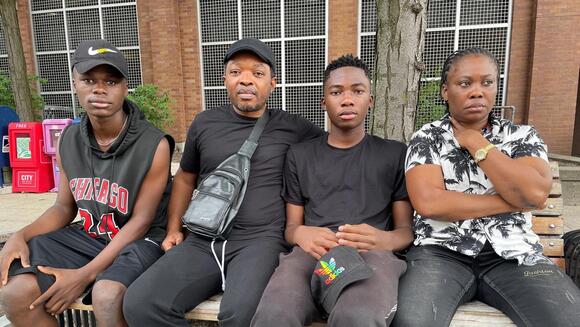Roughly 250 children from asylum-seeking families are set to start school next week in four upstate counties where New York City has placed them through contentious resettlement efforts.
The children are entitled by law to a public education, regardless of their immigration status. Their transfers from the city to other parts of New York over the last few months has passed the notable responsibility of schooling to the communities where they now live, even as the city continues to pay for their hotel lodging, food and other costs.
The new students are enrolled in Schenectady, Erie, Albany and Monroe counties. Their school districts are getting no immediate funding from either the state or New York City to hire more teachers or aides, if needed, although they may later recoup at least part of those costs.
The incoming students are a small fraction of the 14,000 kids from asylum-seeking families who reportedly were enrolled in New York City schools as of April. The city, which currently has around 59,000 asylum seekers in its care, has taken in more than 100,000 in all since Texas and Arizona began busing them to New York from the southern border in the spring of 2022.
Which upstate schools are they attending?
Perhaps the biggest influx will be in Mohonasen School District, a 2,700-student system in Schenectady County that is expecting 70 students from families living at a Super 8 motel in Rotterdam.
Shannon Shine, Mohonasen's superintendent, told the USA Today Network this week he estimates his district will pay at least $300,000 in additional personnel costs. It's hiring two more English language teachers, two teaching assistants and a part-time social worker to accommodate the new students, most of whom speak Spanish.
Incoming students:How NY schools will handle student influx as 'large numbers' of asylum seekers arrive
The other new enrollments of migrant children from the city, based on USA Today Network reporting and published accounts, include about 120 students in three Erie County districts; 39 in North Colonie School District in Albany County; and 18 in City of Rochester schools.
Three of seven counties where asylum seekers were placed have no school-age children among them. The 272 migrants bused to hotels in Orange and Dutchess counties in May were all men who came to the U.S. without kids. And the roughly 400 migrants housed in three Westchester County hotels include no kids ages 5 and older — at the insistence of local officials.
"We've been very clear to the City of New York that it is unwise to have school-age kids here in the suburbs," Westchester County Executive George Latimer said Monday during a weekly video address.
Latimer argued Westchester was less suitable for migrant students than New York City because it has multiple school districts with varying capacities and different funding means than the city's school system. Another contrast, he said, was that the city's schools are controlled by the mayor, while he has no control over Westchester schools.
With the reopening of schools approaching, State Attorney General Letitia James and Education Commissioner Betty Rosa issued a strongly worded reminder this week about the legal rights to public education for any children ages 5 to 21.
"This right is firmly embedded in our Constitution, federal and state laws, and the regulations that govern our state’s public schools," they wrote.
How does the funding work?
State education officials said this month the state could offer various forms of assistance but no emergency funding for districts enrolling migrant students from New York City. Its help could include "technical assistance, training, classroom tools, and professional development" to teach English learners.
Gov. Kathy Hochul also pointed out that districts got big increases this year in foundation aid — their main source of state funding — that could help them absorb unforeseen costs.
That is borne out in aid figures for districts where asylum-seeker students enrolled. Mohonasen School District's funding jumped by $4.7 million, or $27%. North Colonie's leaped by $7.9 million, or 37%. Maryvale School District, an Erie County school district with 66 new migrant children enrolled, got an increase of $4.6 million, or 31%.
Shine, the Mohonasen superintendent, told the USA Today Network his district should get reimbursed at least partially next year through foundation aid for its increased enrollment. But he said he didn't know yet if it would fully recover the roughly $300,000 in estimated additional costs.
Districts also could apply to the state for tuition reimbursement for educating homeless children from another district. If approved, the state could then charge New York City a "basic contribution" for that expense if it's deemed the "district of origin," said Keshia Clukey, a state Education Department spokeswoman.
"The Department is examining all funding streams and appropriate funding mechanisms with our partners in federal and state government to ensure districts have the resources they need to provide all students equitable access to a high quality education," Clukey said in an emailed statement.
How many more may enroll?
The city so far has bused more than 2,100 asylum seekers upstate, but it's unclear how many more it can send until lawsuits over those transfers are resolved. Temporary court orders have halted further placements in Orange and Dutchess counties and prevented any from happening in Rockland.
Erie County had been more receptive until now, with more than 500 asylum seekers placed in three hotels in the town of Cheektowaga, just outside Buffalo. But the town is now fighting the use of hotels as de facto shelters as a zoning violation, and a judge this week issued an order stopping any more placements.
Chris McKenna covers government and politics for The Journal News and USA Today Network. Reach him at cmckenna@gannett.com.

No comments:
Post a Comment